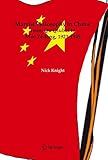Marxist Philosophy in China: From Qu Qiubai to Mao Zedong, 1923–1945 / by Nick Knight.
Tipo de material: TextoEditor: Dordrecht : Springer Netherlands, 2005Descripción: xiv, 245 páginas recurso en líneaTipo de contenido:
TextoEditor: Dordrecht : Springer Netherlands, 2005Descripción: xiv, 245 páginas recurso en líneaTipo de contenido: - texto
- computadora
- recurso en línea
- 9781402038068
- B1-5802
Springer eBooks
Marx, Marxist Philosophy and the Construction of ‘Orthodoxy’ -- Qu Qiubai and the Origins of Marxist Philosophy in China -- Qu Qiubai and the Origins of Marxist Philosophy in China -- The New Philosophy and Marxist Philosophy in China -- Ai Siqi and Mao Zedong -- Ai Siqi on the New Philosophy -- Li Da and Marxist Philosophy in China -- Mao Zedong and the New Philosophy -- Mao Zedong on Dialectical Materialism -- From the New Philosophy to ‘Mao Zedong Thought’ -- Conclusion.
This book examines the introduction of Marxist philosophy to China from the early 1920s to the mid 1940s. It does this through an examination of the philosophical activities and writings of four Chinese Marxist philosophers central to this process. These are Qu Qiubai, Ai Siqi, Li Da and Mao Zedong. The book sets the philosophical writings of these philosophers in the context of the development of Marxist philosophy internationally, and examines particularly the influence on these philosophers of Soviet Marxist philosophy. It argues that these Chinese Marxist philosophers’ interpretations of Marxist philosophy were quite orthodox when judged by the standards of contemporary Soviet Marxism. The book explores core themes in Marxist philosophy in China, including the dilemma of determinism, and investigates the way in which these Chinese Marxist philosophers sought a formula for the ‘Sinification’ of Marxist philosophy that both retained the universal dimensions of Marxism and allowed its application to the Chinese context. The book concludes with analysis of the role of the Yanan New Philosophy Association in developing from Soviet Marxist philosophy the philosophical dimension of Mao Zedong Thought, the official ideology of the Chinese Communist Party after 1945.
Para consulta fuera de la UANL se requiere clave de acceso remoto.


